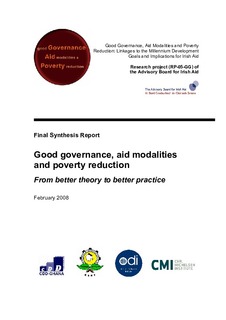| dc.contributor.author | CDD-Ghana | |
| dc.contributor.author | ESRF | |
| dc.contributor.author | ODI | |
| dc.contributor.author | CMI | |
| dc.date.accessioned | 2018-01-04T08:15:35Z | |
| dc.date.available | 2018-01-04T08:15:35Z | |
| dc.date.issued | 2008-02-15 | |
| dc.identifier | oai:www.cmi.no:2951 | |
| dc.identifier.citation | London: ODI, CMI, CDD-Ghana, ESRF | |
| dc.identifier.uri | http://hdl.handle.net/11250/2474510 | |
| dc.description.abstract | Leaders of the world community have committed themselves to providing development assistance on a scale and in a form that enables developing countries to achieve the Millennium Development Goals. In 2008, the international community will come together twice, in Accra in September and Doha in November, to assess the progress made in implementing these commitments. This report synthesises the findings of a two-year research project commissioned by the Advisory Board for Irish Aid which speaks directly to the agenda of these high-level reviews. The work was undertaken by staff and associates of the Overseas Development Institute, London; the Chr Michelsen Institute, Bergen; the Economic and Social Research Foundation, Dar es Salaam; and the Center for Democratic Development, Accra. It addressed the theme of "Good Governance, Aid Modalities and Poverty Reduction" through eight workpackages - involving desk studies and/or brief fieldwork - on particular topics together with a synthesis study drawing on this and other research. The report deals with the challenges implicit in the commitment of leading donor agencies, including Irish Aid, to deliver aid for development in ways that help poor countries to "own" their development efforts, by using and helping to strengthen their policy-making capacities and management systems. This is the rationale of General Budget Support and other new aid modalities linked to so-called Programme-Based Approaches. It is also at the centre of the vision of the 2005 Paris Declaration on Aid Effectiveness. This approach is strongly grounded in experience and theory, but the practice has proven problematic in a number of respects, raising a series of questions for researchers and development agencies alike. These are addressed in first half of the report (Part 1). If countries are to assume ownership of their development processes, changes in the way they are governed are also required. What this implies donor policie | |
| dc.language.iso | eng | |
| dc.publisher | ODI, CMI, CDD-Ghana, ESRF | |
| dc.relation.uri | https://www.cmi.no/publications/2951-good-governance-aid-modalities-and-poverty | |
| dc.title | Good Governance, Aid Modalities and Poverty Reduction. From Better Theory to Better Practice | |
| dc.type | Research report | |
